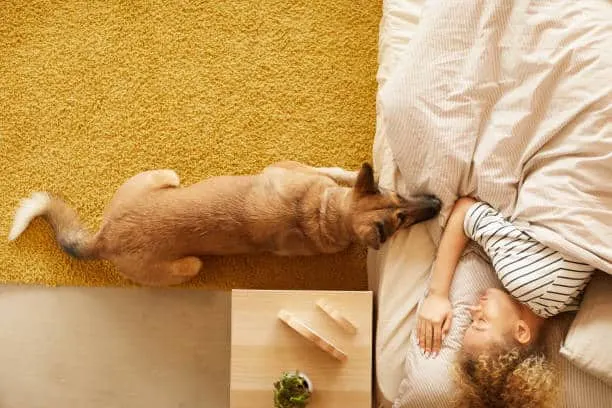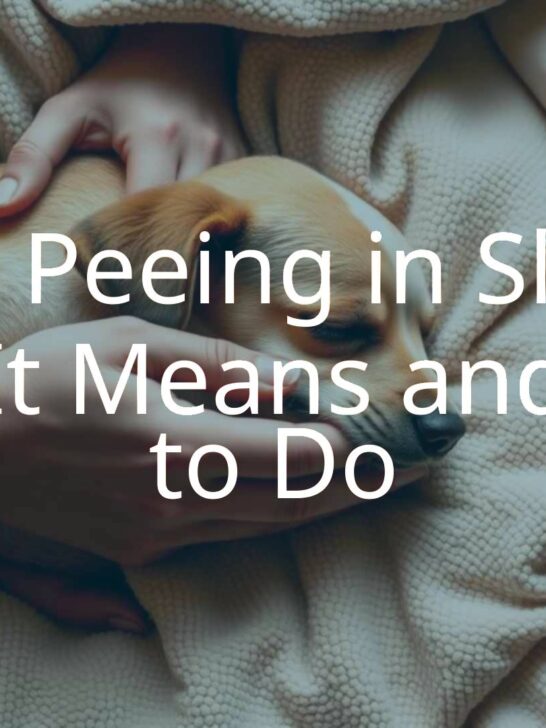Why Do German Shepherds Prefer To Sleep With Their Owners?
If you’re the proud owner of a German Shepherd, you already know that the breed is strong, protective, and loyal.
What you might not know is that they have specific reasons for wanting to cuddle up with their humans at night—and these reasons might not be the ones you have in mind.
All living things behave in a manner that’s consistent with their background and upbringing. In the case of purebred dogs like the German Shepherd, certain mannerisms are hard-wired into their DNA.
Here, we’ll delve into the inner workings of these unique creatures to find out what makes them tick—or snore, in this case.

The German Shepherd: A Brief History
According to the AKC, German Shepherds have been bred since the late 1800s, when a German military officer named Max von Stephanitz set out to create the ideal herding dog.
It took the better part of 35 years to perfect the breed, but the results were impressive—a smart, swift, and intelligent animal, skilled in a variety of tasks.
Over the years, the German Shepherd cultivated a strong reputation as a loyal and authoritative breed.
It was von Stephanitz himself who eventually shifted the focus from herding to police and military work and great effect.
Today, German Shepherds are the preferred companion of K-9 units and similar outfits all over the world.
While it might take some time for German Shepherds to warm up to their human companions, their eventual devotion is unwavering and absolute.
They’re standoffish and aloof with strangers, but quick to respond in emergencies, always pitting themselves against any perceived threats.
This authoritative nature is at odds with their nocturnal behavior, which is why we’ve put together this list of reasons why German Shepherds can usually be found snuggled up in bed beside their owners.
Why Is My German Shepherd Always Sleeping Next To Me?
If you’re reading this article, there’s a good chance that you’ve already asked yourself this question and are searching for answers.
There’s no singular reason for these types of behaviors, but you might be able to pinpoint the correct one through a simple trial-and-error process.
They’re natural herders
This is the first and most obvious response. Since German Shepherds were bred to draw their flocks closer together, it stands to reason that they’d want to keep their human “flock” together during the night.
They’re also hardwired to spend as much time as possible with their owners, which only serves to reinforce this ingrained impulse.
According to VetStreet, German Shepherds are not cut out for the backyard lifestyle. If you own one of these dogs, you need to be prepared to make room for him or her as a regular member of the household.
They have separation anxiety
If your dog has separation anxiety, you’ll be the first to know.
This anxiety occurs when an animal is greatly attached to its owner or other family members (fur-covered or otherwise) and becomes upset when they leave.
It sometimes manifests itself in destructive behavior and could be a major factor in their refusal to leave you alone during the night.
The ASPCA has several guidelines on how to handle separation anxiety.
For an energetic and active breed like the German Shepherd, it might be as simple as making sure they’re getting enough exercise and attention throughout the day.
You might also entice them with treats or puzzle toys whenever you leave the house, which will condition them to view your departure in a more positive light.
If you believe your dog might be suffering from severe separation anxiety, it’s important to first rule out any potential underlying causes, like a medical problem.
Once you’ve ruled that out, you can determine whether a more intensive treatment regimen might be in order.

They’re afraid for your safety or their own
This might not be an issue if you’ve had the dog since it was a small puppy, but if you’ve adopted your pet from a shelter, it’s a real possibility.
Shelter dogs can easily become fearful or anxious when they’re left alone, especially if they were treated badly in their former lives.
They might also be trying to protect you from what they perceive as an external threat—for example if you have overnight guests with whom the dog is unfamiliar.
You can train your dog to be less anxious by slowly introducing him or her to strangers in a neutral environment.
Keep a supply of small treats on hand for people to offer. This will help the dog to associate strangers with delicious rewards, thereby dialing back the perceived threat.
If you believe the dog is trying to protect you and not itself, it’s likely because he or she has been rewarded for this type of protective behavior in the past.
While it’s perfectly natural for the animal to want to guard its owners, be careful only to praise him or her if the threat was genuine, and not a mere chance encounter with a neighbor.
They’ve been trained to sleep next to people
Perhaps you got the dog as a puppy, when it was small and cuddly and an irresistible sleeping companion.
Or maybe you adopted it from a shelter, and its previous owners allowed it to sleep in their beds from day one.
Whatever the reason, if the dog’s first impulse is to jump onto your bed, there’s a good chance that it’s been conditioned to do so.
They’re trying to keep warm
This is the least likely reason for the behavior, but it’s still a possibility.
Pet behavioral expert Dr. Margaret Gruen suggests that dogs who curl up in the fetal position during sleep are attempting to keep warm, in addition to protecting their vital organs.
If your German Shepherd is taking this position night after night, it might be seeking additional warmth by climbing into bed with you.
How Do I Get The Dog To Sleep In Its Bed?
Are you looking to reroute the dog’s habit of claiming a portion of your bedcovers for its own? In addition to the tips we’ve provided above, you might want to try the following strategies.

Make their bed more appealing
Does your German Shepherd have its sleeping area? If not, now is the time to set up a special spot that’s just for them, away from the hustle and bustle of the regular household.
If your dog is a puppy, invest in a bed that will be large enough when they grow to full size.
They may look small and lost at first, but it’s better to get them used to the bed now so you don’t have to start all over again once they reach adulthood.
Encourage your dog to lay down on the bed, enticing it with praise, treats, and other rewards.
If you’ve been teaching them the “stay” command,” this is the ideal place in which to practice. Simply keep repeating the command until they’re able to stay for long periods.
Provide plenty of positive reinforcement
Don’t be tempted to skimp on the treats and rewards. Start with plenty of high-value treats, such as bits of hot dog, cooked chicken, or cheese.
Use these when you’re training the dog to “stay” on the bed, and they’ll associate these tasty benefits with the behavior you’re trying to encourage.
Apprehensive about training a dog to stay in its own space? Check out this handy YouTube tutorial, which takes a great deal of the guesswork out of the process. It even includes tips on finding the perfect bed.
Consider using a crate
If the training isn’t going as well as you’d hoped, consider investing in a crate.
The enclosed area might help the dog to feel safe and secure—which, as we’ve mentioned, could be one of the reasons for its clingy behavior.
Anna Flayton, who’s a senior dog trainer for Chicago’s PUPS Pet Club, encourages patience and flexibility during this step. The process can take up to six months, even when you’re doing everything right.
Use the positive reinforcement described earlier to help the dog associate the crate with good times and relaxation.
Toss a ball into the crate and encourage the pup to run in after it, or fill a puzzle toy with treats and place it inside.
Once the dog gets used to the crate, you can experiment with leaving him or her inside for longer periods, and eventually overnight.

Do I have to train the dog to sleep in its bed?
In a word, no. As long as you don’t mind sharing your space with your furry friend, there’s no reason why they can’t sleep in your bed.
Just remember that if you start when they’re small, you might be in for a rude awakening (literally) when he or she grows up.
If you prefer to have your dog sleep with you at night, there are numerous ways to encourage him or her. Take a look at this YouTube video for inspiration.
If you do opt to train your German Shepherd to sleep on its own, be consistent.
Don’t cave in and allow them to jump back up on your bed just because you’re tired or frustrated with the animal’s whining. The bottom line: You’re the master, and you set the rules.




















